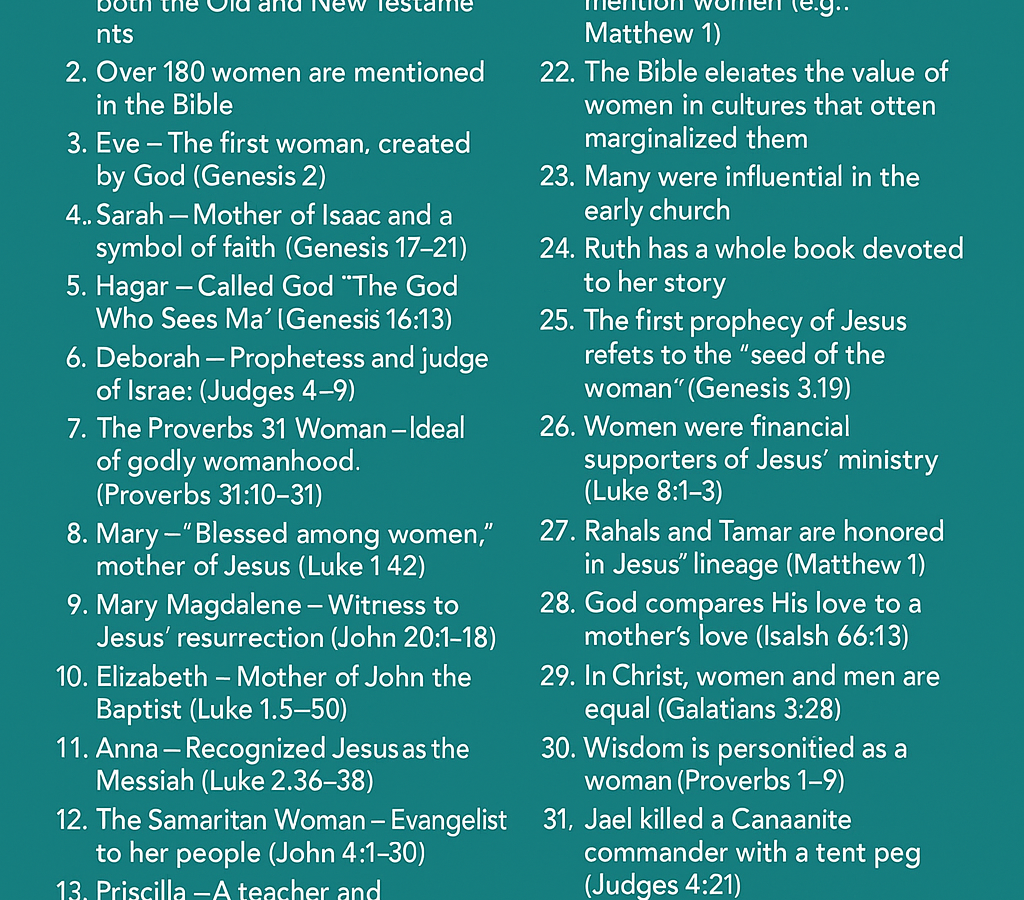Here are some fascinating and powerful facts about women in the Bible—highlighting their impact, stories, and spiritual significance:
General Facts
- Women are featured in key roles throughout both the Old and New Testaments.
- There are named women in every section of Scripture—law, history, poetry, prophecy, Gospels, and epistles.
- Over 180 women are mentioned in the Bible (some named, many unnamed).
- The Bible portrays women as leaders, prophets, warriors, mothers, and disciples.
- Women were the first witnesses to Jesus’ resurrection—a groundbreaking detail in ancient times (Luke 24:1–10; John 20:1–18).
Notable Women and Their Roles
- Eve – The first woman, created by God (Genesis 2).
- Sarah – Mother of Isaac and a symbol of faith (Genesis 17–21).
- Hagar – The only person in the Bible to give God a name: El Roi, “The God Who Sees Me” (Genesis 16:13).
- Rebekah – Wife of Isaac, mother of Jacob and Esau, a key figure in God’s covenant line (Genesis 24–27).
- Leah and Rachel – Sisters who both became wives of Jacob and mothers to the twelve tribes of Israel (Genesis 29–35).
Women in Leadership
- Deborah – A prophetess and the only female judge of Israel (Judges 4–5).
- Miriam – A prophetess and worship leader, sister of Moses and Aaron (Exodus 15:20).
- Huldah – A prophetess consulted by King Josiah about the Book of the Law (2 Kings 22:14).
- Esther – A Jewish queen who saved her people from genocide (Book of Esther).
- The Proverbs 31 Woman – An ideal of wisdom, diligence, and godly womanhood (Proverbs 31:10–31).
Women in the Gospels
- Mary (mother of Jesus) – Called “blessed among women” (Luke 1:42), chosen to bear the Son of God.
- Mary Magdalene – A devoted follower of Jesus, the first to witness His resurrection (John 20:1–18).
- Elizabeth – Mother of John the Baptist, filled with the Holy Spirit (Luke 1).
- Anna – An elderly prophetess who recognized Jesus as the Messiah when He was an infant (Luke 2:36–38).
- The Samaritan Woman – First evangelist in John’s Gospel; Jesus revealed His identity as Messiah to her (John 4:1–30).
Women in the Early Church
- Priscilla – A teacher and missionary, often listed before her husband Aquila (Acts 18:24–26; Romans 16:3).
- Phoebe – A deacon and the one who likely delivered Paul’s letter to the Romans (Romans 16:1–2).
- Junia – Described as “outstanding among the apostles” (Romans 16:7).
- Lydia – A businesswoman who hosted one of the first house churches in Europe (Acts 16:14–15).
- Lois and Eunice – Grandmother and mother of Timothy, praised for their sincere faith (2 Timothy 1:5).
Spiritual Themes & Insights
- Women often exemplify great faith, courage, and obedience in Scripture.
- God includes women in His redemptive plan, from Eve to Mary to the church.
- Many genealogies in Scripture mention women, which was culturally uncommon—yet God honors their place (e.g., Matthew 1).
- The Bible elevates the status of women in a world where they were often marginalized.
- Paul affirms that men and women are equal in Christ (Galatians 3:28).
Miscellaneous Interesting Facts
- There is a book of the Bible named after a woman: Esther.
- Another woman, Ruth, has a whole book devoted to her story as well.
- Mary is the most mentioned woman in the Bible.
- The first prophecy of Jesus (Genesis 3:15) refers to the “seed of the woman.”
- Women were financial supporters of Jesus’ ministry (Luke 8:1–3).
- God compares His love and comfort to a mother’s love (Isaiah 66:13).
- The Bible often uses strong female metaphors—e.g., wisdom personified as a woman in Proverbs.
- Jael (Judges 4) killed a Canaanite commander with a tent peg—yes, seriously!
- Some women, like Tamar and Rahab, had rough pasts but are honored in Jesus’ lineage (Matthew 1).
- In Revelation, the church is symbolized as a bride, showing how deeply God values His people.







